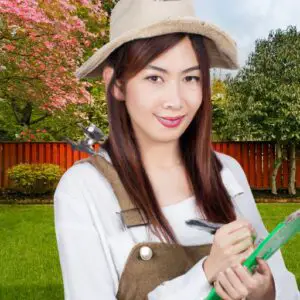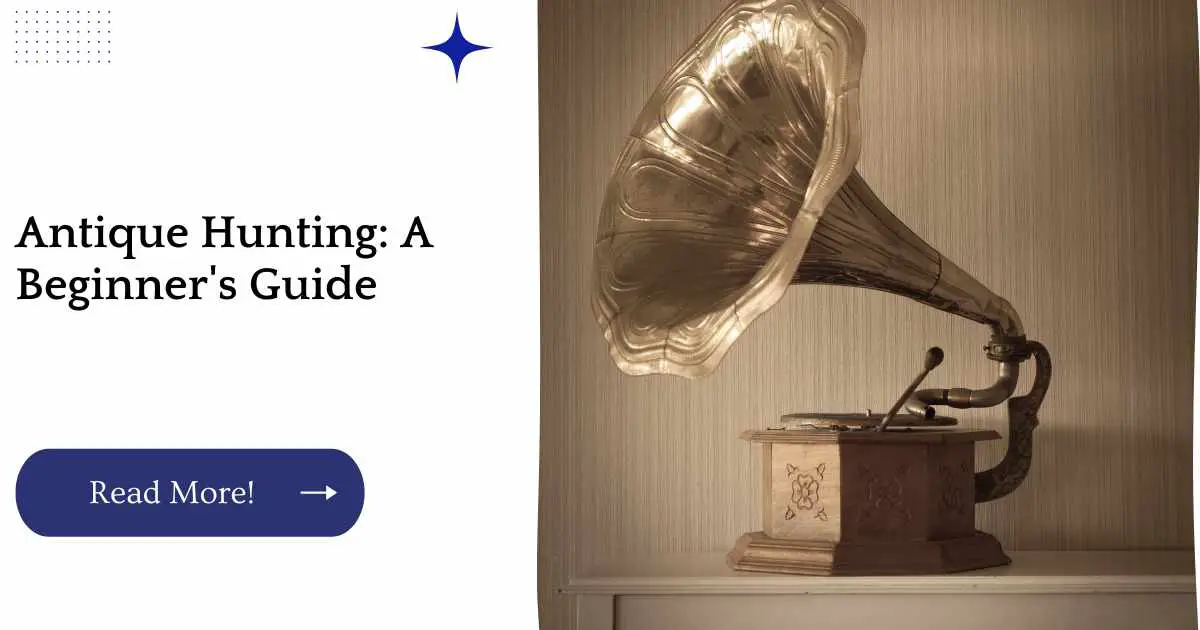Antiques are beautiful, interesting, and sometimes valuable. They can also be very expensive and confusing.
That’s why we’ve put together this guide to Antique Hunting 101. It’s meant to help you get started in the world of antiques without making any costly mistakes.
| Takeaways |
|---|
| Buying antiques can be an exciting and rewarding hobby for beginners. |
| When buying antiques, it’s important to consider factors such as the item’s condition, authenticity, and provenance. |
| Authenticity can be determined by a number of factors, including age, materials, and construction techniques. |
| Proper care and maintenance can help preserve the value and beauty of your antique collection. |
| Antiques can be found at a variety of places, including antique shops, auctions, and online marketplaces. |
| Identifying different antique styles and periods requires research and knowledge of specific characteristics and features. |
What A Good Antique Is
Many people think that antique means valuable, but that’s not always the case. The word “antique” refers to something old, and you can find antiques both old and new. An antique doesn’t have to be valuable, but it does have to be old.
A good example would be a vintage car from the 1950s that you bought for $10 at your local garage sale it’s an antique because it was built before 1960 (and still runs), but it probably won’t fetch much at market value since there are so many of them around today.
You’ll also want to look out for fakes when buying antiques; these range from reproductions made intentionally as copies of older pieces through outright fraud where someone tries passing off something they bought at Target as authentic Victorian furniture without telling anyone its true origins (shady).
“Have you ever wondered about the history behind your antique finds? Our article on the fascinating history behind your antique finds explores the stories and context behind these treasures, adding even more value to your collection.”
What A Good Antique Is Not
Antiques are not new items that are made to look old. They’re also not furniture, tools or any other object that is over 100 years old.
In fact, there’s no real way to determine exactly how old an item is without doing extensive research on it.
While some people can identify antiques based on the materials used or their craftsmanship, others may have trouble telling if something is real because of its age alone and even then, it’s still possible for someone else’s grandfather to have found a valuable antique at a garage sale!
How To Use Outside Resources To Find Antiques
The internet is a great place to start your antique search. You can find out which antiques are in high demand and how much they are worth, and you’ll also be able to see what other people have paid for similar pieces.
Local resources such as libraries, museums, art galleries and antique stores may have information about locally-made antiques that you can use. If nothing else, these places often have brochures with pictures of some local items that might interest you enough to check out further.
Antique magazines contain articles about collectibles from all over the world—you should check them out if you’re looking for inspiration or want more ideas on where to look for certain items. They also give advice on whether or not it’s safe to buy an item online without seeing it in person first (eBay).
“Antique hunting is all about finding unexpected treasures in unique places. From flea markets to estate sales, check out our article on finding antiques in unexpected places to learn about the best spots to find your next hidden gem.”
Identifying An Antiques Dealer
The first thing you should do when you’re ready to buy an antique is find a reputable dealer. There are several ways to do this, and we’ll go through them here.
A sign in the window of a local shop that says “Antiques” or “Antiquarian Books” can be a good way to start your search. If there’s no sign out front, look for a storefront with similar signage inside (the words “antiques” or “antiquarian books” may be printed on the business cards they give out).
A website with lots of information about their products can be another good indicator that they’re selling authentic antiques; many stores will also include their phone number so you can call if you have any questions about their merchandise before making a purchase.
If all else fails, ask around your friends who live nearby might know where there are great antique shops! Of course, it’s always best practice when doing anything involving money: do an internet search on each individual business owner as well as anyone connected with them (e.g., family members), checking social media accounts and public records such as newspaper articles.
“Antique hunting is a thrilling adventure, and sometimes the best treasures are the ones you discover while searching for something else. Our article on 10 tips for finding hidden treasures on your antique hunting adventures provides expert advice on how to uncover those hidden gems.”
When You’ve Found An Antique, But Aren’t Sure Of The Value
When you’ve found an antique, but aren’t sure of the value
Once you’ve found an antique that you want to sell, it’s a good idea to do some research on its value.
There are many ways to do this:
Find out if it’s authentic by searching online. Make sure your sources are reliable before you get your hopes up (eBay can be great for this).
Look at similar items sold in recent sales and auctions around the world, then compare the results with yours.
If there’s very little information on similar items, look at similar places where they might have been sold previously (this may require some detective work) and ask sellers questions about their own pieces they may have insight into what makes them valuable.
They might also know whether their pieces were one-offs or part of a series in which case they could help you find more examples!
The Art Of Negotiating
Negotiating is an art, and there are many ways you can go about it. If you’re new to antique hunting, here’s some advice:
Ask for a lower price. This isn’t always possible, but it pays to ask when you know the seller has room to negotiate on their end. Be polite and courteous; don’t be offensive or rude by demanding that they drop their prices by x amount of dollars.
Don’t let your emotions get in the way of making a good deal for both parties involved in a transaction and remember that it’s okay if something doesn’t work out! There will be more opportunities down the road, so don’t fret too much over one snag or another along life’s road (which is hopefully filled with lots more antiques).
Be prepared to compromise. It may seem silly at first glance compromise? Isn’t that a word used when two people have opposing ideas/opinions? Well yes…but compromising doesn’t necessarily mean giving up on what matters most; instead it means finding solutions that satisfy everyone involved while still maintaining integrity within each person’s beliefs system (or lack thereof).
“Preserving antique treasures for future generations is an important responsibility for collectors. Check out our guide on antique restoration and preserving the past to learn about the best practices for restoration and how to ensure your antiques last for generations to come.”
Finding Out What You Are Actually Buying (And What It Isn’t)
- Know the difference between an antique and a reproduction.
- Be able to identify the differences between a genuine antique and a fake antique.
- Know how to spot an original piece as compared to its copies or copies of copies (if there are any), so you know what you’re buying before making your purchase.
- Understand the difference between a first edition vs. second edition in order to make sure that what you’re buying is authentic and not just another copy or replica of something else entirely different from its original form!
Being An Expert In Your Area Isn’t Necessary
Being an expert in your area isn’t necessary, but it’s helpful. You’ll want to know what kinds of antiques are popular and which ones aren’t, and where the best places to find them are.
While you don’t have to be an expert on every piece you come across, it can help if you’ve got a good idea of how much an item is worth up front.
This way, when someone offers less than its value or price range, you can tell them politely that their offer isn’t appropriate for the item and suggest something else instead.
“The thrill of the hunt is what makes antique hunting so exciting, and sometimes you stumble upon incredible discoveries. Our article on stories of incredible antique discoveries shares some of the most fascinating and unexpected finds made by collectors, providing inspiration for your own antique hunting journey.”
Conclusion
It’s not about being an expert. It’s about paying attention to the details, knowing when you have something valuable on your hands, and taking time to make sure you’re getting a good deal.
We hope that this guide gives you a few more tools for navigating these waters (and helps you avoid some pitfalls). Enjoy!
Further Reading
Here are some additional resources for beginners interested in buying antiques:
A Beginner’s Guide to Buying Antiques – This guide provides tips on what to look for when buying antiques, including how to identify different styles and periods.
A Beginner’s Guide to Buying Antiques – This article covers the basics of antique buying, including where to start, what to look for, and how to care for your antiques.
A Beginner’s Guide to Antiques – This guide covers a range of topics for new antique collectors, including the history of antiques, how to spot fakes, and how to care for your collection.
FAQs
What should I consider when buying antiques for the first time?
When buying antiques for the first time, it’s important to consider factors such as the item’s condition, authenticity, and provenance. You should also do your research on the style or period of the item to ensure you’re making an informed purchase.
How can I tell if an antique is authentic?
Authenticity can be determined by a number of factors, such as the item’s age, materials, and construction techniques. It’s important to do your research and consult with experts when evaluating an antique’s authenticity.
How do I care for my antique collection?
Proper care and maintenance can help preserve the value and beauty of your antique collection. This includes keeping items out of direct sunlight, avoiding exposure to moisture or extreme temperatures, and handling items with care.
Where can I find antiques to buy?
Antiques can be found at a variety of places, including antique shops, auctions, and online marketplaces. It’s important to do your research and shop around to find the best deals and quality items.
How do I identify different antique styles and periods?
Identifying different antique styles and periods requires research and knowledge of specific characteristics and features. It can be helpful to consult with experts or reference guides to assist in identifying antique styles and periods.

Hi there! My name is Hellen James, and I’m here to talk to you about treasure hunting. I’ve been a fan of treasure hunting ever since I was a kid, and if you’re a fan of treasure hunting or just like the idea of finding a long-lost fortune, then this blog is for you.

